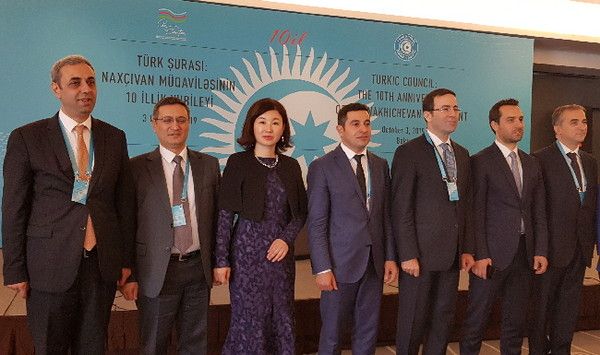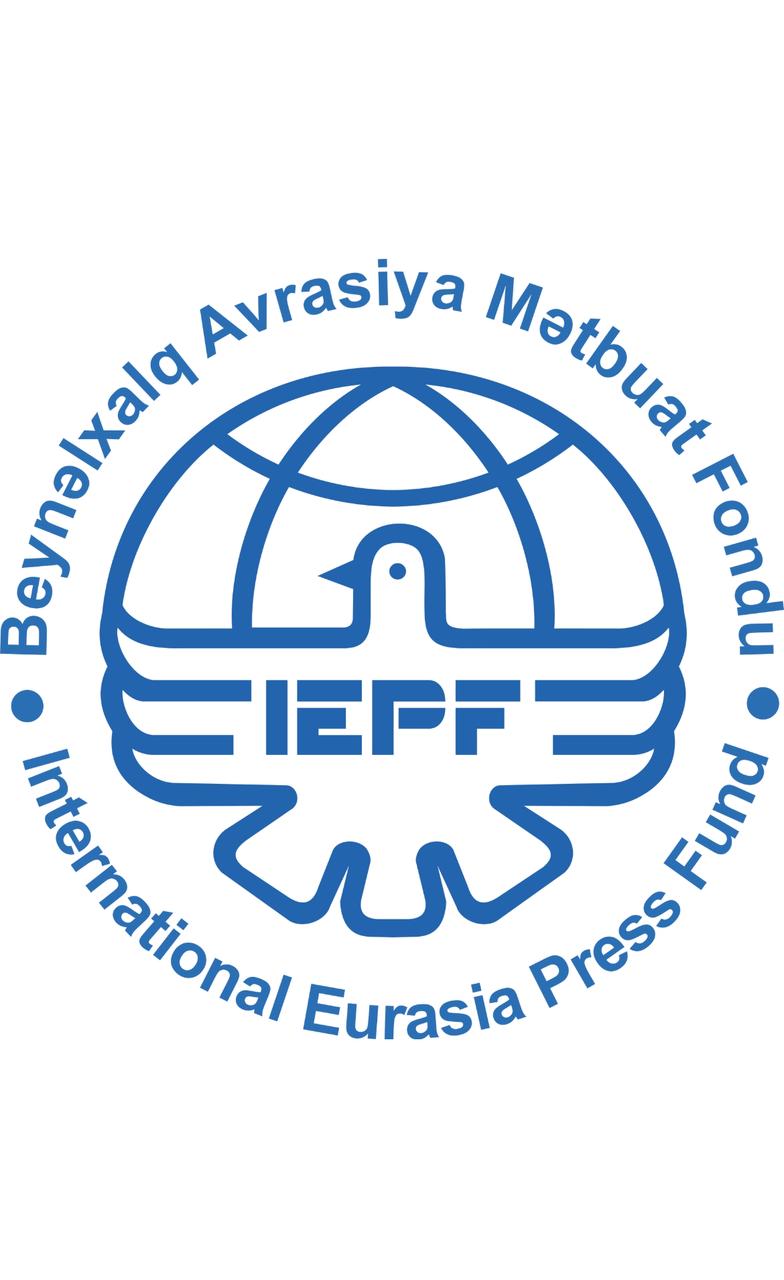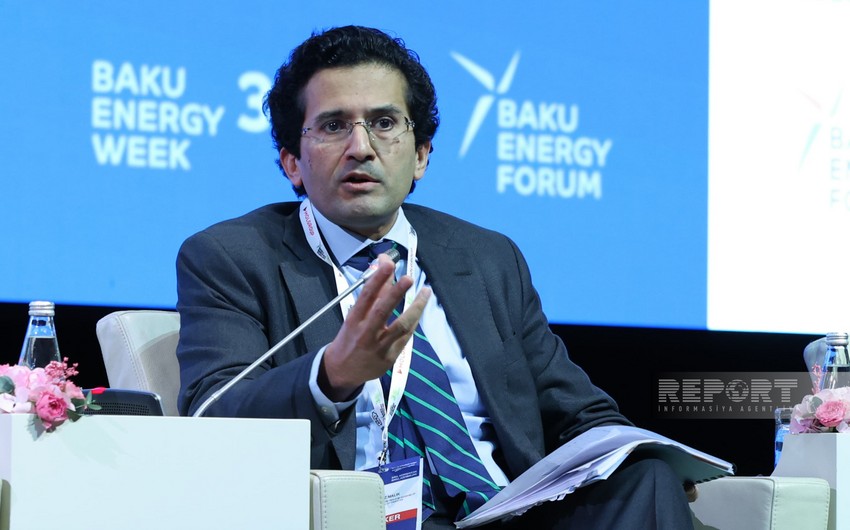Eunkyung Oh, professor of Dongduk Women’s University is the only scholar in the world who has received Doctor of Science degree from Uzbekistan and Doctor of Philosophy from Turkey . She received two doctoral degrees from different Turkic Countries. She attained a Ph.D from Turkey in 1999, and earned her Doctor of Science from Uzbekistan in 2014.
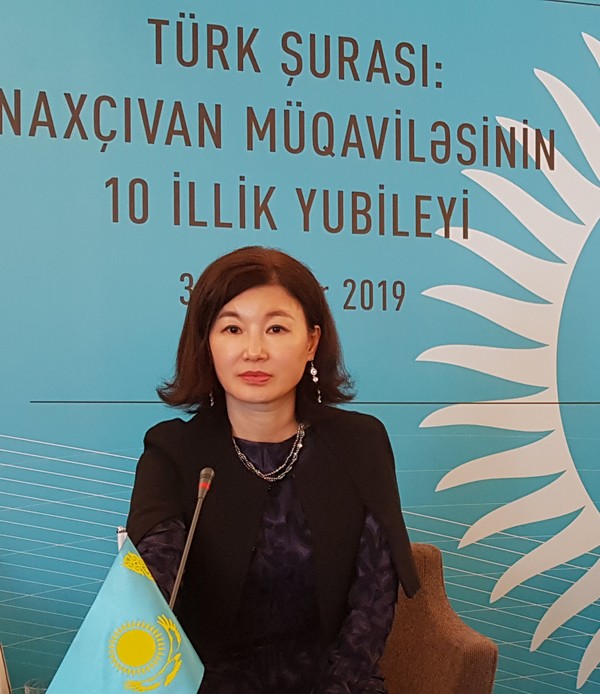
She was awarded with the “Best Scholar Award” from the Azerbaijan National Academy of Sciences Literature Institute around the end of last year. Since 2014, the Azerbaijan National Academy of Sciences Literature Institute has been conferring the “Best Scholar Award” to the most outstanding scholar in humanities and Turkology every year to promote the great works of the Azerbaijan ethnic poet, Nizami Gencevi. Earlier this year, she was also awarded with the honorary doctorate degree from Azerbaijan Vector International Academy. She is the first Korean who have received the honorary doctorate degree from Azerbaijan Vector International Academy.
Without a doubt, Professor Oh is a world-renowned scholar on the Turkology, but she does not get much attention from the Korean media and academia. She could hardly have a chance to conduct major lectures in Korean universities due to Korean custom which provides less opportunity or support to scholars pursuing minor studies.
Professor Oh asserted that beginning in the 21st century, Turkic countries, stretching from Russia to Central Asia and Turkey, have been receiving tremendous political and economic attention, and South Korea should establish an institution and system to study Turkic countries. Professor Oh argued that this is especially true as the United States, led by President Biden, has a very keen confrontation with Russia and China. In this time, South Korea has to turn her eyes to Turkic countries in the Central Asia.
Central Asian countries not only have plentiful natural resources, but also are blessed with an ideal natural environment for the production of renewable energy like wind and solar energy. The Biden administration especially has encouraged the “C5+1” to diversify cooperation channels and is paying significant attention to Central Asia. Professor Oh maintains that although Turkic countries currently have huge economic reliance on Russia and China, we can expect a greater American influence among the Central Asian countries eventually.
Professor Oh pointed out another reason why South Korea should start studying about Turkic countries; there are 180,000 and 100,000 Korean Diaspora “Koryo-saram” living in Uzbekistan and Kazakhstan respectively. She asserted that Korean Diaspora “Koryo-saram” are essential human resources to the conflict between South and North Korea. We have recently conducted a written interview with Professor Oh. Here is the question and answer:
Q. Which countries are considered a Turkic?
There is a ‘Turkic Belt’ which connects Russia, China, and Central Asia to Turkey. Within the ‘Turkic Belt,’ there are: countries such as Turkey, Azerbaijan, Turkmenistan, Uzbekistan, Kazhakstan, Kyrgyzstan; the Altai Republic, the Tuva Republic, the Republic of Khakassia, the Sakha Republic, the Republic of Bashkortostan, and the Republic of Tatarstan of the Russian Federation; and the Xinjiang Uyghur areas in China.”
Q. Is there a Turkic studies in South Korea?
There is no department majoring in Turkic studies or Turkology in South Korea, yet. However, there are several departments that offer a partial major in individual countries or the Central Asia area. Hankuk University of Foreign Studies established a Turkish department in 1973, which can be seen as the first seed that was sown in South Korea. Right now, you can pursue a major in Turkic languages at the following universities: Department of Turkish, Azerbaijani and Central Asian Language at Hankuk University of Foreign Studies, Department of Russian, Turkish and Central Asian Language at Busan University of Foreign Studies, Department of Asian Languages and Civilizations at Seoul National University. The major problem is that without a firm collective view on Turkic Studies or Turkology, we are limited to studying on an individual nation only.”
Q. Why are the Turkic countries important, from the perspective of South Korea?
“These countries are undergoing a rapid economic growth based off their vast energy and agricultural resources. They are also exerting significant power within the international political and economic order. The recent increased interest on Turkic areas is not just due to such economic and political factors. The humanistic heritage of Eurasian-Turkic belt countries, formed along the Silk Road, is an essential cultural and political resource in establishing the foundation of transnational and trans-ethnic identity. Moreover, South Korea has linguistic and cultural affinities with the Turkic Belt countries, as Korea is located the closest to them in cultural coordinates. Hence, further study on Turkic studies is essential to expand a mutual relationship by clarifying the cultural interrelationship between Eurasian-Turkic countries and South Korea. By securing the cultural solidarity between Turkic countries and South Korea, the cultural connection can be enhanced which could be used for a foundation for further political and economic exchange.”
Q. What do you mean by “they can be used for a foundation for further political and economic exchange”?
“First of all, Turkic countries in the Central Asia except Turkey are main target countries under the current administration’s Northern Economic Cooperation Initiative for Korean Government policy. They are known as the last market for South Korea to pioneer, with infinite value and potential. Despite this, the reality is that there is not a sufficient amount of active studies on Turkic people and countries in South Korea. I believe that not many scholars have been nurtured yet to carry on the studies. There are not enough experts to work in Turkic countries. The Biden administration has been exercising a sensitive confrontational approach to Russian and China since the inauguration. In such times, South Korea should switch her attention to Turkic countries in the Central Asia. Such tension with Russia and China may be a bigger opportunity to pioneer out to the Turkic countries in the Central Asia. Politically speaking, Turkic countries would side with South Korea in the international stage. Given the international situation, these countries would always side with South Korea. If China were to provoke and confront Korea, such as the THAAD deployment in 2016, South Korea can persuade the Turkic countries to put pressure on China instead.”
“Turkic language consists of various languages such as Turkish, Azerbaijani, Turkmen, Kazakh, Uzbek, Kyrgyz, Altaic, Yakut, Tartar, Bashkir, Uyghur and so on. Language is the most important factor in constituting an ethnicity. Various ethnic groups who speak Turkish, Azerbaijani, Kazakh, Uzbek and Kyrgyz languages created their unique ethnic identity by sharing culture, history, cooperation, and confrontation which created geo-political and geo-economic situations. Hence it would be simple to describe them as different national identity who share the same ethnic origins. For your knowledge, these languages are very distinctive and different – they would not understand each other. At the summit meeting between Turkish and Uzbekistan presidents, they always use interpreters.”
Q. Which one of the Turkic countries should South Korea pay an extra attention to?
“Each country has respective meaning and roles, so they are all important. If I were to choose two countries, it would be Turkey and Uzbekistan. Uzbekistan is culturally and historically very important. The future of Uzbekistan will have an enormous impact on regional security and development in Central Asia. This has been the case for the past and now. As the center of Central Asia, Uzbekistan has played a pivotal role in traffic and exchange where the Silk Road civilization prospered. Turkey is not only the end of the Silk Road but also the place for fusion and recreation of Western and Eastern civilizations. Economically speaking, there are about 33 million people in Uzbekistan, while there are 85 million people in Turkey. There are roughly about 2 billion people who speak Turkic language. That is a lot of people and 80% of them are less than 30 years old, which indicate the vast potential for growth.”
Q.Which Turkic countries have you been and studied for your degrees?
“I earned my Ph. D degree in Turkey, and received my Doctor of Philology in Uzbekistan. The Doctor of Philology I have earned in Uzbekistan is not a Ph. D degree but a Doctor of Science, which is equivalent to Habilitation of Germany. At a same time, it is a degree for professorship. It was the first time a foreigner earned a Doctor of Science in humanities in Uzbekistan, and nobody has succeeded since then. Even among the Uzbek and other Turkic local scholars, only 2% of them are awarded with this degree so I do get a lot of admiring attention. Unfortunately, this degree has zero recognition in South Korea, so there is no merit in receiving one in Korea. I started the study because I wanted to be properly recognized by competing against the local scholars. The process was arduous. It was difficult studying overseas at an older age, but the review process itself was so demanding and stressful that most of the local scholars either gave up, and a lot of people had strokes during the process of evaluating the dissertation examination. I still do not know how I endured through the process. Moreover, I took a leave from being a professor and spent all my savings on studying in Uzbekistan. When I came back to Korea later, I had to start from the scratch. All this started with reckless courage. After obtaining the degree in Uzbekistan, I carried on with field work and overseas research. During breaks, I went to another Turkic country. I stayed in the Altai Republic, the Sakha Republic, and Azerbaijan where I picked up the Altaic language and Azerbaijani, researched, and networked with local scholars. These are all my precious assets.”
- 2021 is the 30th anniversary of establishing diplomatic relations between Turkic countries and South Korea. What are some events that are around the corner?
“2021 is the 30th anniversary of independence for Uzbekistan, Kazakhstan, Kyrgyzstan and Turkmenistan. 2022 is the 30th anniversary of forming diplomatic relations with South Korea. The Institute for Eurasian Turkic Studies in Dongduk Women’s University, where I am the director, will be hosting an academic conference late this year along with the Uzbekistan and Kazakhstan embassies in Korea, to commemorate their 30th anniversary of independence. Also we will be issuing a special journal on the ethnic poets of the respective countries. For Uzbekistan, it will be about Alisher Navoy. For Azerbaijan, it will be about Nizami Gencevi. I expect the government to host various events to commemorate the 30th anniversary of the establishment of diplomatic relations. However, there is no formal announcement of the plan. There was a suggestion to establish an “Institute for Turkic Culture,” with the help of ambassadors from each Turkic country, along with the momentum from the 30th anniversary. However, this suggestion was not formally passed along to the Korean government yet. In addition, we are in the talks to erect a statue of Alisher Navoy in front of the Seoul City Hall and Sejong the Great at Tashkent. Also, KF Korea-Central Asia Cooperation Forum Secretariat is planning to release a selection of works from contemporary writers from each Central Asian country. Turkic countries want to be treated as “civilized nations”, not as “markets.” I sincerely wish that various literature and works of art will be introduced in Korea for everyone to encounter and understand Turkic culture. These things are very important in the perspective of diplomatic policy.”
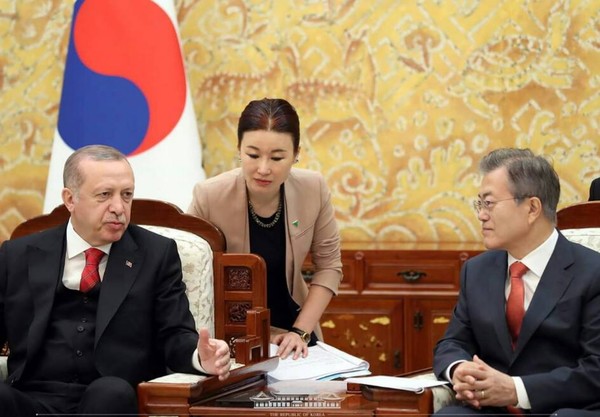
Q. Please let us know your point of view how to strengthen the relationship with Turkic countries?
“We need to establish an institution and system to ensure a continued coordination with Turkic countries. First is to establish a national policy institute and think tank. Turkic countries are the future alternate market place for young Korean people to explore. Therefore the government should initiate and lead studies on respective countries to launch various projects. Turkic countries have immense value and potential for South Korea to study and utilize, across political, economic, humanities and social aspects. The national policy institute would have to set up a department to oversee its function as a think tank – strategy planning and establishing vision. In doing so, a collective concept that includes both Persian culture and Mongolian culture should be constituted.
Second, nurturing professionals and talents is urgent. Active strategies such as establishing a department of Turkic Studies or Turkology in universities should be sought after. The current strategy the Korean government is pushing for are focused on providing support on studies on Korea and Korean language in Central Asia, and inviting Turkic civil servants or students to Korea to study. This has further deteriorated the gap in the number of Korean scholars on Turkic belt countries. To resolve, there should be projects and funds established to encourage opening up departments of Turkic Studies or developing a specialized universities. Right now, the National Institute for International Education is running the Critical Foreign Language Education Promotion which simply encourages establishing a class for foreign language. Such initiatives should be further expanded to create a department that combines linguistic, cultural, historical, social, logistical, economic and trade, multi-cultural, IT, AI and other aspects. There is a severe lack of initiative to nurture talents with regional expertise. The National Research Foundation of Korea under the Ministry of Education should make funds to establish departments of Turkic Studies and nurture specialized universities.
Third, the Korean government will have to be an observer member of the “Turkic Council”. The “Turkic Council” is a council for countries that speak Turkic languages. It was established in 2010, and the council has been monumental in driving cooperation in political, economic, social, cultural, educational, trading, traffic, and logistical aspects among the Turkic countries. Turkey, Azerbaijan, Uzbekistan, Kazakhstan and Kyrgyzstan are main members while Turkmenistan and Hungary are associate members. The importance of Central Asia is being further emphasized, and through the “Turkic Council,” Turkic countries are enhancing cooperation. Amidst the rising tension between US and China, South Korea needs to diversify her cooperation channels. Turkic countries especially have cultural affinity with Korea. Geopolitically, Turkic countries include the Caucasus area that connects Asia and Europe, and occupy the majority of the Eurasian continent. By participating in the “Turkic Council”, I hope that further opportunities could be actively sought for economic and cultural network, and Korean companies for further expansion into the Eurasian continent. Fourth, it is true that Turkic countries are not business-friendly. Without the help of government, it is very difficult for a large corporation to run a B2B project. Therefore a special organization such as “Turkic countries economic cooperation center” should be established to resolve various problems a corporation faces in Turkic countries with constant consulting and help. However, such an organization should be equally set up in each Turkic country and should be strictly organized with a direct communication channel to the prime minister.”
Q Please tell us your biography in detail.
“I graduated from Hankuk University of Foreign Studies, and earned my Master’s and Ph. D degree from Hacettepe National University in 1999, in the field of Turkish Literature and Comparative Literature respectively. I completed my Post-doc at the Academy of Korean Studies from 2000 to 2001. In 2014, I was the first foreigner to have earned the Doctor of Science (Professor degree) from Academy of Sciences of Uzbekistan after researching on the oral literature and folklore and comparative literature of Uzbeks in 2013. I am a member of the Academy of Sciences of Uzbekistan since 2017, and an honorary member of the Azerbaijan writer alliance since 2018. I have received an honorary doctorate degree from Azerbaijan Vector International Academy. I was awarded the “Cultural Ambassador Award” in 2020 from the Eurasian Press Foundation (IEPF). I also received the “Best Scholar award” of 2020 from the Azerbaijan National Academy of Sciences Literature Institute.
My main experience would be working as the Turkish correspondent for Munhwa Broadcasting Corporation (MBC), full-time foreign professor at Ankara University in Turkey, Korean studies professor at Nizami Pedagogical University in Uzbekistan. Currently, I am a professor at College of Humanities Dongduk Women’s University in Korea, as well as the director for The Institute for Eurasian Turkic Studies. At the same time, I served on the advisory board for International Information & Networking Centre for Intangible Cultural Heritage in the Asia-Pacific Region under the Auspices of UNESCO, ICHCAP (UNESCO Category 2) and evaluation committee for the National Research Foundation of Korea. I am also currently serving as a ministerial civilian advisor for the Presidential Committee of Northern Economic Corporation, advisory committee member for KF Korea-Central Asia Cooperation Forum Secretariat, Refugee Committee under Ministry of Justice, Seoul Metropolitan City Diplomacy, and Multicultural Committee of Seoul Metropolitan City. I have over 150 papers and columns published in English, Turkish, Uzbek and Russian and almost 40 books.”
Q.What was your most rewarding experience in your career to date?
“In August 2018, the Uzbek government invited me to participate in an academic conference. President Shavkat Mirziyoyev of Uzbekistan gave me a gift. In May 2019, I was invited by UNESCO and Uzbekistan Ministry of Culture to participate in an Uzbek intangible cultural heritage event; Baxsh festival. At the opening ceremony with distinguished guests from over 80 countries, President Mirziyoyev called out on my name and thanked me in as he opened his speech. This was never expected and I was really impressed. Nobody in Korea knew who I was although I studied really hard in Uzbekistan, but I was very proud to have been recognized by the Uzbek President.
Another experience was when I was awarded the “Cultural Ambassador Award” from the Eurasian Press Foundation (IEPF) and also received the “Best Scholar award” of 2020 from the Azerbaijan National Academy of Sciences Literature Institute. This year in 2021, the Azerbaijan Vector International Academy has conferred me with the honorary doctorate degree. It was also the second rewarding thing for me to be awarded an award suddenly. I had no connection or network with the Vector International Academy and the Eurasian Press Foundation (IEPF). I was surprised that they have reviewed my research and academic activities, and decided to give me with the honorary doctorate degree and “Cultural Ambassador Award” . I checked the list of people in the past who was awarded with the degree and they were people like Nazarbayev, the first President of Kazakhstan, Süleyman Demirel, former President of Turkey and big writers like Chingiz Aitmatov. Ethnic poet Bahtiyar Vahabzade, whose work I have translated into Korean (for the first time) and introduced to Korea, was also a recipient of the degree. I was happy from the bottom of my heart by the fact that I have received the same degrees that such great people have received.
Thirdly, I secured $1.5 million (USD) from the National Research Foundation of Korea to establish The Institute for Eurasian Turkic Studies at Dongduk Women’s University. The Institute was set up to run various research and academic activities. There were many students who gave up pursuing Turkic studies. Moreover, many of them knew that they had no place for a job even after their studies. So many students gave up in halfway. There were even cases of scholars being forced to leave the academic even after obtaining the Ph.D. I have gone through a similar arduous situation so I felt very rewarded for having established a research institute for the next generation of Turkic scholars. Moreover, this institute is the first of its kind and the only one of its kind. Scholars from Korea and overseas are showing immense interest in the Institute. To promote Turkic studies or Turkology, the institute has hosted various events such as lessons on the Turkish and Uzbek languages, colloquiums, guest speakers, academic conferences and so on. At the colloquium, people from various levels and places such as Jeonju, Busan, and Daegu came to attend. There were many lonely graduate students studying Turkic studies who attended as well. I was very happy to have provided a nest for the lost graduate students, connect people with same interest and provide an opportunity to network. It took immense sweat and blood to secure the funds for the Institute, but I am extremely happy that South Korea now has a research institute on Turkic studies that carries out essential functions in and out of the country. Before I retire, I simply hope to pass down my experience and research materials to the next generation of Turkic scholars.”
Q. Please tell us of your hardiest times in your career to date.
“People have the wrong perception and prejudice, which makes studying Turkic studies difficult. For South Korea, almost every aspect of life goes around America or Western culture. It certainly broadens the perspective but is limited only to the 4 powerful countries near Korea. People tend to view other countries for a one-time tour and do not pay further attention. Such biased views of the world deteriorate the value of diversity. I tried so hard to confront, fight, and overcome such situations in order to convince people. But most of the time, I could not complete my initiatives due to people’s skewed perceptions.
Secondly, the majority of Turkic countries are very patriarchal; South Korea too. Things have gotten better now, but looking back, I have faced so much adversity just for being a woman. When I was younger, it was uncomfortable realizing that people viewed me as a “young woman” instead of a “researcher or scholar.” The world has changed a lot since then, and I am happy to no longer face such problem as I have aged.
The most difficult part was that it is extremely hard to find an opportunity to demonstrate your capacity in this major. Despite such difficulty and adversity, there were many others who supported me and opened doors for me. That was our only glimpse of hope. I hope that I can bring a small change to the world so that everyone can be happy where diversity and mutual coexistence is possible.

